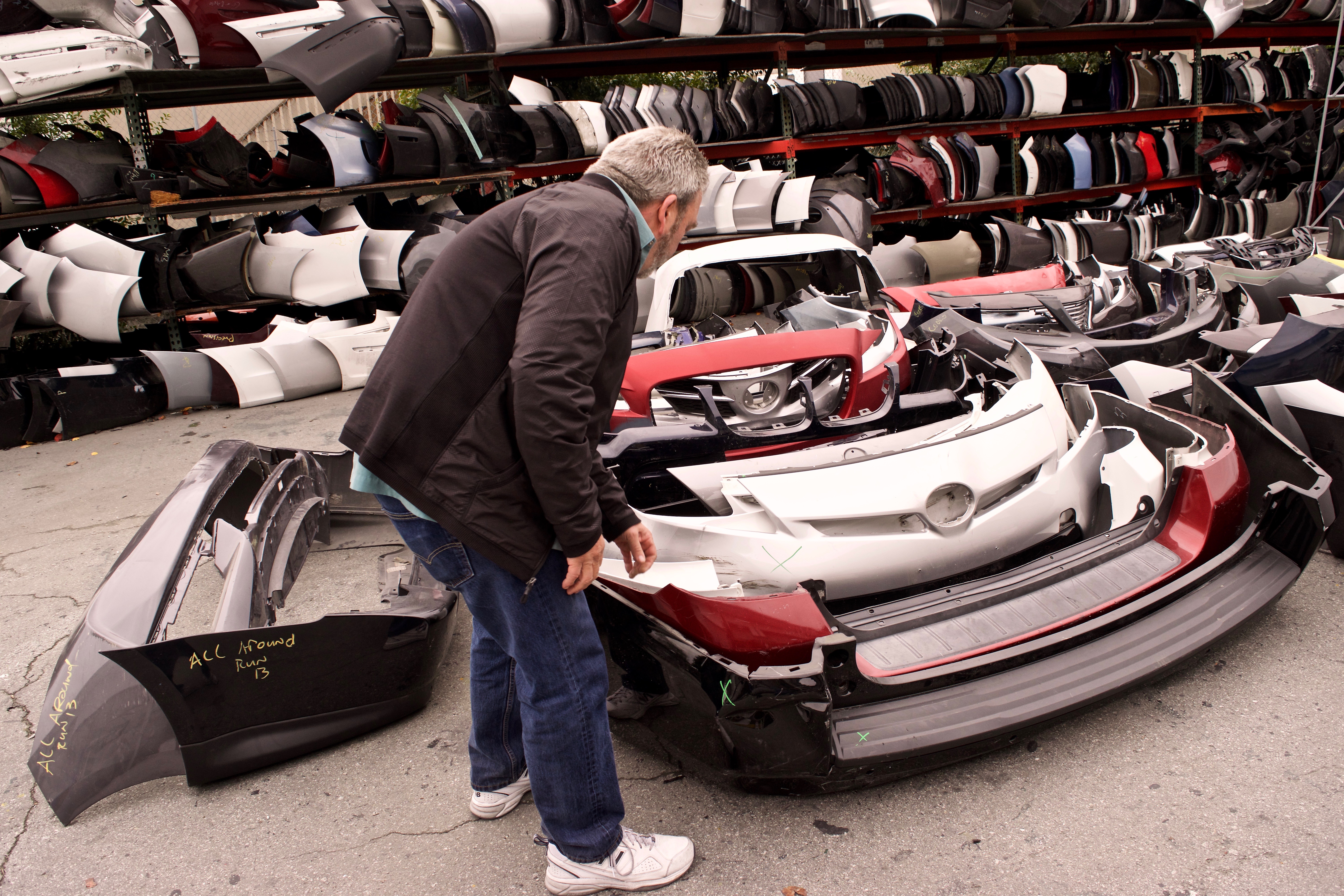

Faith Bumper Service has been around since 1975 repairing automobile bumpers from all over the Bay Area, but recent market changes are putting it on the brink of closing shop. The family owned business was located on Di Giulio Avenue in Santa Clara from 1994 to 2016 before relocating to Gilroy. The business was originally started by the father of current president, Bill Foote, who works closely with his wife Laura, as well as his son, daughter and brother. Beyond the family, Faith Bumper employs many from the community, some of whom have worked there for over 20 years, possessing special skills unique to the bumper repair trade.
While repairing damaged bumpers is the focus, Faith Bumper Service provides another indispensable function. About half a million pounds of rubber bumpers are diverted from landfills and recycled due to the business’s efforts; a number Foote estimates to be about 80 percent of the region’s total bumper waste.
“Back in the day when we fixed chrome-platted bumpers, 90 percent of the bumpers that came to us were repairable, so we kept them,” explained Foote. “With rubber bumpers about 85 to 88 percent are not repairable.”
Foote stores these non-repairable bumpers at the Gilroy shop before sending them to a company in Texas that recycles the material for re-use as planter boxes and parking lot curbs — uses, which Foote believes are just a small fraction of the actual possibilities for the rubber material.
During the height of the Great Recession in 2008, Faith Bumper Service was forced to downsize operations from 80 employees to 30. Although economic conditions are now more robust, Foote said that beginning two years ago, major auto manufacturers began trying to shut out competition from after-market sellers of parts such as bumpers, grills and fenders, by dropping prices for new parts. In the e-marketplace, online parts platforms list the cheapest prices first, and insurance companies ask auto body shops to choose parts at the lowest prices. While Foote said that Faith Bumper can match the quality of a new bumper, most consumers prefer a brand new bumper if it’s being sold at the same price as a repaired one. Faith Bumper will also match the lower prices, but being a small business, most consumers don’t even know to ask.
These changes have put pressure on the business to the point of almost closing its doors, which would not only be a major blow to the family and longtime employees, but could put tons of unwanted bumpers into landfills.
“The problem has really intensified for us in the last few weeks,” said Foote. “Things just dropped off the last two weeks in November, we lost about five bumpers per day — the bottom just fell out. We’re losing about $1,500 per day in sales and are deciding whether to fold up shop. I’ve been doing this since 1975 so it’s a big deal to me. I’m not asking for a lot, just to continue business so we can get bumpers either repaired or recycled.”
The shop and yard at Faith Bumper Service is filled with bumper inventory, but they regularly get truckloads of about 80 bumpers brought in from auto body shops. To demonstrate the impact of the business closing, Foote recently stopped the bumper deliveries, leaving them to pile up at various Bay Area auto body shops, where he said they’ll likely end up being taken to landfills in the potential absence of Faith Bumper. Despite this illustration, Foote admitted that there’s only so much the shops can do, and that the future lies with decision-making made by insurance companies and consumers.
“It’s a matter of keeping all these families employed, that’s our main concern,” Foote stated. “The older guys are going to have a tough time. There are people I know it’s going to hurt.”
At one time the idea had emerged of Faith Bumper Service expanding to do the recycling onsite, but such an operation would require about $250,000 worth of machinery and an amount of space not feasible for a small family business to acquire. Foote said that only a handful of companies recycle bumpers nationwide. Some bumpers have been sent to China, but the Chinese government started limiting the amount of international waste it imports this year.
CalRecycle, is a department within the California Environmental Protection Agency, which oversees all the hazardous material and recycling programs in the state. Much of CalRecycle’s $1.4 billion budget flows back into local economies in the form of payments and grants to help recycling and waste management businesses operate. However, vehicle tires are currently the only rubber product that the agency has programs geared towards.
“California does not have any programs related to bumper recycling or a specific list of businesses that conduct that work,” stated Lance Klug, public information officer at CalRecycle.
As the business hangs in limbo, Foote has placed some hope in community activism as he tries to communicate his plight to insurance company representatives. He has also reached out to the California State Automotive Association and state politicians, seeking policy avenues that may keep Faith Bumper afloat.
Right or wrong, agree or disagree, common sense or no sense, if your thinking matches up…
Friday afternoon’s baseball matchup between the Wilcox Chargers and Milpitas Trojans was pretty much decided…
Super Bowl preparations are coming together, with the city manager saying the final agreements will…
It was March 2020, and the world was spinning in a direction no one expected…
Welcome to Santa Clara Dr. Damon Wright, the new Superintendent of the Santa Clara Unified…
The best theatrical show in Santa Clara isn’t at the Santa Clara Players or the…